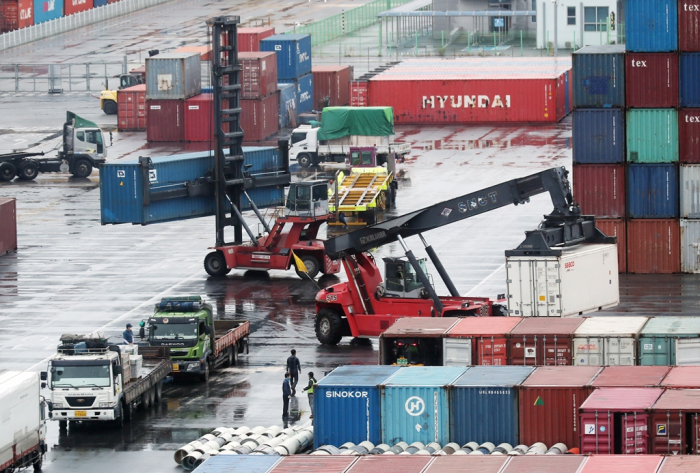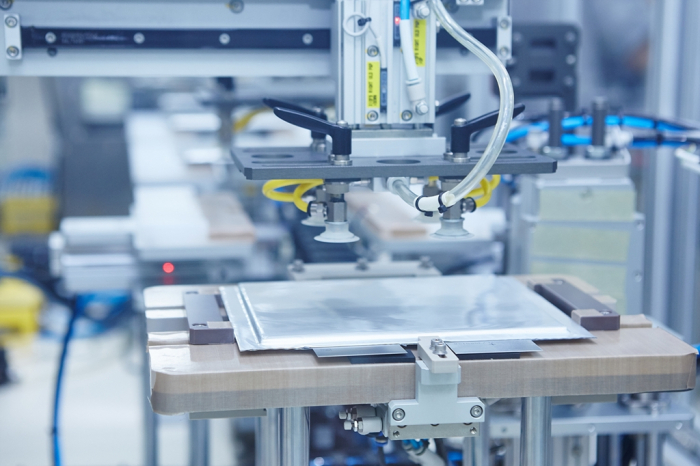Supply chain
Korean manufacturers’ dependence on China intensifies
Calls for diversification of import sources increase; imports of urea, a key DEF material, from China tumble
By Jul 11, 2022 (Gmt+09:00)
3
Min read
Most Read
LG Chem to sell water filter business to Glenwood PE for $692 million


Kyobo Life poised to buy Japan’s SBI Group-owned savings bank


KT&G eyes overseas M&A after rejecting activist fund's offer


StockX in merger talks with Naver’s online reseller Kream


Mirae Asset to be named Korea Post’s core real estate fund operator



South Korean manufacturers are importing even more key industrial raw materials from China, deepening concerns over the dependence of Asia’s fourth-largest economy’s growth on its neighboring giant.
Manufacturers continue to rely on imports of core materials from China as the top 72 imported items, of which the raw materials make up more than 70%, accounted for 81.2% of imports in the first five months of the year, slightly higher than 81% a year earlier, according to The Korea Economic Daily’s analysis of customs data on Monday.
The local industry bought all its magnesium ingot, an essential material for aluminum alloys used to lighten automobile bodies and aircraft components, for a second straight year from China.
Imports from China of colored galvanized steel sheets, a type of colored steel sheet used in various sectors such as the construction and electronics industries, accounted for 99.2% of the total $141.2 million.
CAN STOP PRODUCTION AT ANY TIME
Local steel makers such as Dongkuk Steel Mill Co. and KG Dongbu Steel Co. produce color-coated steel, but their prices are high, especially on healthy consumption from home appliances makers since the outbreak of COVID-19. So, demand for Chinese products was strong, industry sources said.
“Demand for cheap Chinese products is so common in Korea,” said a steel industry official. “Some industries could collapse without the supply of Chinese products.”
Procurements of some other key materials from China also topped 90%. They included aluminum cables with 98.9%, manganese products with 93.4%, raw materials for secondary batteries with 91.6% and steel frames with 91.3%.
Among the battery materials, imports from China of lithium oxide, cobalt oxide, cobalt sulfate, and synthetic graphite accounted for 94.5% on average, also up from 87.6% a year earlier.
“Once the supply of raw ingredients from China is cut off, Korea’s production of secondary batteries and their materials will be completely stopped,” said a battery industry source. South Korea is home to the world’s three battery makers – LG Energy Solution Ltd., SK On Co. and Samsung SDI Co.

MORE VULNERABLE
South Korean manufacturers have been relying on imports of raw materials and parts from China to make products, considering the country’s variety of commodities, cheap prices and transportation costs given the short distance between the two countries, analysts said.
But that raised South Korea’s vulnerability to China to any supply disruption. Last year, South Korea suffered from a diesel exhausted fluid (DEF) shortage due to China’s ban on overseas shipments of urea, a key material for the liquid used to cut pollution from gasoil engines.
“The Korean economy has been growing through the global value chain, in which it imports cheap raw materials from China to make and export products,” said Kim Bong-man, head of the international affairs department at the Federation of Korean Industries, a lobby group for the country’s major conglomerates.
“But we can face supply chain risks, which are similar to the DEF crisis, at any time.”
HEAVY RELIANCE ON CHEAP GENERAL-PURPOSE PRODUCTS
The dependence on Chinese cheap general-purpose products is another issue with buying more than 90% of sanitary goods, thermal containers and umbrellas from China, experts pointed out.
Any disruption in the supply chains of those items could create a daily necessity crisis, they added. Few South Korean companies produce them at home due to high expenses such as labor costs.
And imports from other countries usually cost more, adding to inflationary pressure.
“Most materials and parts, on which we highly depend from China, are avoided by local companies due to the cost burden,” said an official at a small-and-medium-sized enterprise. “The rising reliance on Chinese gives China hegemony in the supply chain.”
Industry experts have urged diversifying supply sources to reduce the dependence. South Korea already procured urea from other countries to cut reliance on China and prevent another DEF crisis. Its imports of the DEF material from China accounted for 23.6% this year, less than half the 66.6% of a year earlier, as the country purchased 28.8% from Qatar, 12.5% from Indonesia and 12.4% from Vietnam.
Write to Kyung-Min Kang at kkm1026@hankyung.com
Jongwoo Cheon edited this article.
More to Read
-
 Supply chainDeepening diesel exhaust fluid crisis puts Korea’s key industries at risk
Supply chainDeepening diesel exhaust fluid crisis puts Korea’s key industries at riskNov 05, 2021 (Gmt+09:00)
6 Min read -
 BatteriesKorea battery makers at risk from reliance on China materials
BatteriesKorea battery makers at risk from reliance on China materialsFeb 16, 2022 (Gmt+09:00)
2 Min read -
 Supply chainUrea crisis lays bare South Korea’s heavy dependence on China
Supply chainUrea crisis lays bare South Korea’s heavy dependence on ChinaNov 14, 2021 (Gmt+09:00)
4 Min read -
 Supply chainDiesel exhaust fluid shortage threatens Korea’s supply chain
Supply chainDiesel exhaust fluid shortage threatens Korea’s supply chainNov 03, 2021 (Gmt+09:00)
2 Min read
Comment 0
LOG IN


